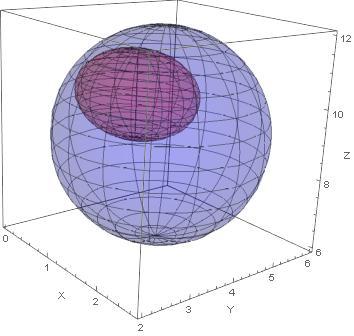Close approach -- nested -- perhaps, not closed form. (Try 2).

The objects are described in 2-dimensional spherical surface coordinates (similar to latitude and longitude) to give Cartesian (x,y,z) coordinates. . . The objects are just the described surfaces. Therefore, the objects are not touching. One is inside the other.
What is ? To help you, the multiplied answer is between 0 and 20.
This problem is difficult because of the lack of a closed form and that the gradient of the distance is very small.
Clarification: Previous version of problem omitted a square root at the very end. I apologize.
The answer is 12.90844.
This section requires Javascript.
You are seeing this because something didn't load right. We suggest you, (a) try
refreshing the page, (b) enabling javascript if it is disabled on your browser and,
finally, (c)
loading the
non-javascript version of this page
. We're sorry about the hassle.
Oops, I missed supplying any solution at all, even though I had the answer myself.
A numerical search for the solution by a find root like process in the four dimensions of the two objects two angle parameters gives: 0 . 1 2 9 0 8 4 4 7 6 7 0 8 6 1 8 , θ 1 → 1 . 0 8 1 7 2 8 3 5 1 3 9 5 6 5 , ϕ 1 → 3 . 7 9 2 0 1 0 0 9 3 0 5 3 6 7 , θ 2 → 0 . 9 2 2 7 4 7 6 3 2 3 8 1 6 8 1 and ϕ 2 → 3 . 9 0 1 9 2 2 8 8 8 5 8 3 6 9 .
To speed the search process, I did an initial, quite coarse search to locate the parameter space of particular interest.